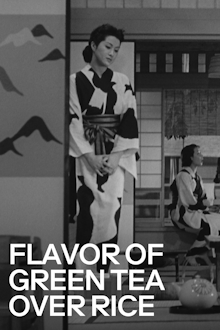This isn’t one of Yasujirō Ozu’s better known works, nor does it star Setsuko Hara. It is however one of his funnier films and it does have a character named Setsuko though she is deceptively not the main character. Instead this is about a middle-aged married couple with a dysfunctional relationship and their failure to communicate with one another. The antics of the spoiled and willful wife are what makes this so funny. Unfortunately it does somewhat revert to an old-fashioned morality lesson and even lectures the audience about how a proper wife should behave at the end but it’s great while it lasts.
A young woman Setsuko spends the day on an outing in Tokyo with her aunt Taeko. They visit a clothing shop run by Taeko’s friend Aya who persuades them to go on an overnight spa trip. Taeko lies to her husband Mokichi that Setsuko is ill to explain her absence but is immediately exposed when Setsuko shows up at the house. She replaces the lie with another and Mokichi affably goes along with it while Setsuko finds it all amusing. During the spa trip, Taeko denigrates her husband, calling him dim-witted, and wishes that his work assigned him to a distant post. Meanwhile Mokichi is helping a young man Noboru get started on his career. They visit a pachinko parlor, then still a very new phenomenon, and discover that it is coincidentally run by one of Mokichi’s buddies from the military. Later when Setsuko’s parents try to arrange a marriage for her, she resists and stands the man up. She insists that arranged marriages between couples are old-fashioned and dysfunctional, citing the relationship between Taeko and Mokichi as an example.
I found this to be delightful and a refreshing departure from Ozu’s usual style because it seemingly depicts a group of willful women with rich and meaningful lives of their own separate from the men. Setsuko can be seen as a very early version of a Manic Pixie Dream Girl, with her overt rebelliousness and readiness to point out the flaws of her elders. The girl group go shopping together, enjoy outings and regularly hide things from their husbands. Incredibly Aya seems to have her own money and when she sees her husband at a baseball game with another woman simply thinks of it as a point of leverage against him. However Taeko goes so far in her disrespect for her husband that eventually even the other women turn against her. So this is less a celebration of girl power than Ozu’s roundabout way of imparting a traditional moral lesson. It would have been a little more balanced if the character of Mokichi had been portrayed as being flawed in some manner but he’s too obviously good and being wronged against to make it morally interesting.
I do love without reservation so many of its vivid depictions of life in Japan of the era: attending a kabuki performance at a theatre in Tokyo, a baseball game, a bicycle racing track, a pachinko parlor, a Japanese-style house with modern appliances, having practically everyone say goodbye to Mokichi at the airport when he leaves for a work trip to Uruguay and so on. Ozu invites us into these not so often seen spaces without judgment. I even got a kick out of seeing Mokichi and his buddy reminiscence about their wartime experiences as they apparently participated in the conquest of Malaya and Singapore. Mokichi gets a happy ending of her own without having to go back on her vow to reject a loveless arranged marriage even if it is predictable. It does represent a compromise of sorts in that it’s okay for the women to demand more and not be stuck in traditional gender roles without going to the extent of deceiving her husband.
I’m less enamored of the central theme of embracing humility because that’s such a typical angle for Japanese films. What makes this film stand out so much for me is its embrace of modernity and how these changes are a positive force in Japanese society.
